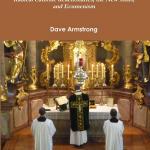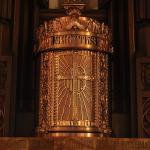
Reactionaries are disproportionately influential in criticisms of Pope Francis.
***
The document from 29 June 2016, signed by 45 theologians, priests, and other Catholic scholars, included ten known radical Catholic reactionaries [see definition] who were signatories of the Filial Correction (which I dealt with at length in my recent paper on that influence). The common reactionary signatories are Fr. Barthe, Fr. Crean, Fr. Hunwicke, Dr. Lamont, Fr. Lanzetta, Dr. Pierantoni, Dr. Radaelli, Dr. Rao, Dr. Shaw, and Dr. Silvas.
Additionally, six more people signed both documents: Fr. Morselli, Dr. Pasqualucci, Fr. Pillari, Dr. Stark, Fr. Tattersall, Dr. Turco. Some of those may also be reactionaries as well. I couldn’t find any relevant data on these men, because most (it appears) write in languages other than English.
Be that as it may, 16 of 45 signatories, or 36%, also signed the more recent Filial Correction. In other words, the two documents are more than one-third produced or agreed-to by the same people.
Moreover, I would classify two additional signatories as reactionaries — or at the very least, close to that position — based on my own familiarity with them: Fr. Brian W. Harrison and Dr. Peter A. Kwasniewski (whom I have dialogued with regarding “the reform of the reform of the Mass”).
Assuming the correctness of my classification, that means at least twelve of the signatories out of 45 (27%), of the June 2016 document, are reactionaries. Many more may be. This is indeed a significant proportion of extremist, quasi-schismatic thinking among the signatories. In other words, they do not represent mainstream orthodox Catholic thought, or the Mind of the Church.
This fact ought to be known.
This doesn’t prove that the arguments they provide in either doctrine are wrong, simply because of the reactionary influence (that would be the genetic fallacy or “poisoning the well” fallacy). I have to clarify this, because I’ll be wrongheadedly accused of it every time if I don’t.
I’m simply providing sociological information, summarized as follows: “there is a distinct group and way of erroneous thinking in the Church, that may properly be called radical Catholic reactionaryism, that long preceded Pope Francis and will continue long after he is gone. This strain of thought is disproportionately influential in both the Filial Correction of Pope Francis and the June 2016 Criticism from 45 scholars.”
What I am presently contending is accurately summed up in the preceding paragraph. I’m very impatient about being consistently misrepresented on this score. There is no excuse for it. As to reasons (going beyond mere sociological observation), I documented exactly why I thought certain signatories of the Correctio were reactionary in my lengthy analysis regarding them. Nor am I saying that only reactionaries have criticized the pope. That would be obviously false, since I stated above that 27% of the ones who signed the June 2016 document were reactionaries. Thus it follows that 73% are not, or at least aren’t known to be.
And I’ve written at length about the nature of this reactionary thought on my web page regarding it and two books (one / two).
What I believe and what I have argued is no huge mystery. But lots of folks love to fight against straw men. We can constructively discuss whether there is such a thing as reactionaryism in the Church, whether or not I have accurately defined it, in my own coined term, and whether given Person X is properly classified as a reactionary.
All of those things are legitimate discussions. But I won’t waste time defending what has never been my position in the first pace (i.e., the straw men that people come up with).
***
Photo credit: Image by “ellisedelacruz” (5-19-16) [Pixabay / CC0 Creative Commons license]
***













